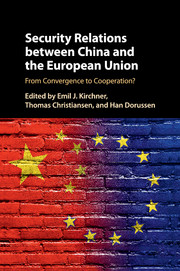Book contents
- Frontmatter
- Dedication
- Contents
- List of Tables
- Preface and Acknowledgements
- Abbreviations
- List of Contributors
- 1 EU–China Security Cooperation in Context
- 2 Chinese and EU Views of Military Security: Crafting Cooperation
- 3 Regional Solutions for Regional Confl icts? The EU, China and their Respective Neighborhoods
- 4 Aims versus Deeds: EU–China Cooperation in Nuclear Nonproliferation
- 5 Terrorism and Organized Crime: Common Concerns but Different Interests
- 6 Chinese and EU Climate and Energy Security Policy
- 7 Competing or Converging Claims on International Order? The EU, China and Human Security
- 8 Civil Protection: Identifying Opportunities for Collaboration
- 9 Cybersecurity and EU–China Relations
- 10 The Economic Security Dimension of the EU–China Relationship: Puzzles and Prospects
- 11 Is Securitizing Migration a Mandatory Choice? Lessons from the EU and China
- 12 Against the Odds: (Considerable) Convergence and (Limited) Cooperation in EU–China Security Relations
- Index
- References
2 - Chinese and EU Views of Military Security: Crafting Cooperation
Published online by Cambridge University Press: 05 September 2016
- Frontmatter
- Dedication
- Contents
- List of Tables
- Preface and Acknowledgements
- Abbreviations
- List of Contributors
- 1 EU–China Security Cooperation in Context
- 2 Chinese and EU Views of Military Security: Crafting Cooperation
- 3 Regional Solutions for Regional Confl icts? The EU, China and their Respective Neighborhoods
- 4 Aims versus Deeds: EU–China Cooperation in Nuclear Nonproliferation
- 5 Terrorism and Organized Crime: Common Concerns but Different Interests
- 6 Chinese and EU Climate and Energy Security Policy
- 7 Competing or Converging Claims on International Order? The EU, China and Human Security
- 8 Civil Protection: Identifying Opportunities for Collaboration
- 9 Cybersecurity and EU–China Relations
- 10 The Economic Security Dimension of the EU–China Relationship: Puzzles and Prospects
- 11 Is Securitizing Migration a Mandatory Choice? Lessons from the EU and China
- 12 Against the Odds: (Considerable) Convergence and (Limited) Cooperation in EU–China Security Relations
- Index
- References
Summary
The concept of “security” has been subject to frequent change and reinterpretation in both Chinese and EU contexts. This chapter will consider military security specifically, which – from a Chinese perspective – has remained largely unchanged despite the end of the Cold War. In fact, the collapse of communist regimes across central and eastern Europe in the summer of 1989, China's own Tiananmen incident in June 1989 and Western-led military interventions in Yugoslavia and the Third World in the 1990s reinforced paranoia about the potential intentions of Western states and whether they wished to encroach on China's sovereignty and territorial integrity. Instead of declining in importance, and in contrast to the preceding ten years of the Four Modernizations push under Deng Xiaoping, military security and the need to modernize China's military forces and technology became first-order concerns in Beijing (Friedberg 2000). Exponential increases in China's military budget took place throughout the 1990s and into the twenty-first century. Tensions with the US and with China's neighbors were heightened in the Taiwan Straits over Chinese military exercises, the US Seventh Fleet responses in 1995, the crash of a US spy plane on Hainan Island in 2001, and by quarrels over potential European and Israeli arms sales to China in 2004–5 and 2007. More recently, China–US security disagreements have centered on the role of the United States as treaty ally with claimants contesting China's sovereignty over islands in the East and South China Seas, and the US’ “pivot” to Asia (Clinton 2011; Len 2012; Wong and Tay 2014).
From the perspective of most European capitals, the end of the Cold War concluded the bipolar, militaristic approach to security. The predominant pattern of conflict became intrastate, and was often fought with low technology and high civilian casualties. The lack of any obvious physical threat to the EU's members, alongside the economic crisis of 2008, served to put defense (and its related expenditure) low on the agendas of member states and, in security terms, emphasized the EU's ability to employ various predominantly soft tools in the security domain. The EU and the United Nations were among the international organizations most active in advocating a vision of world order organized along liberal lines and concerns about “soft security” issues rather than the “hard security” of military jets, tanks and troops (King and Murray 2001; Paris 2001).
- Type
- Chapter
- Information
- Security Relations between China and the European UnionFrom Convergence to Cooperation?, pp. 19 - 41Publisher: Cambridge University PressPrint publication year: 2016
References
- 3
- Cited by

